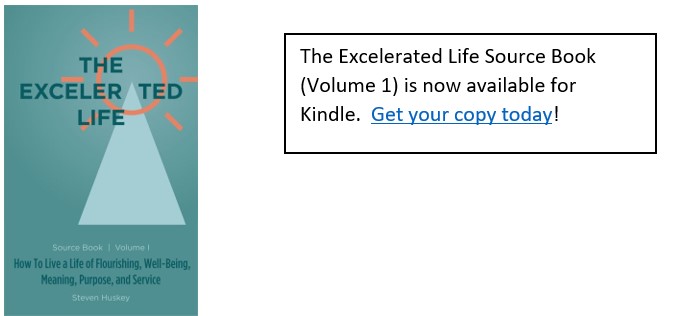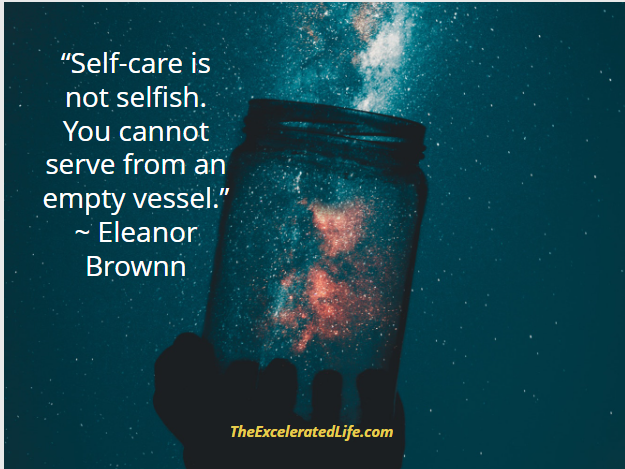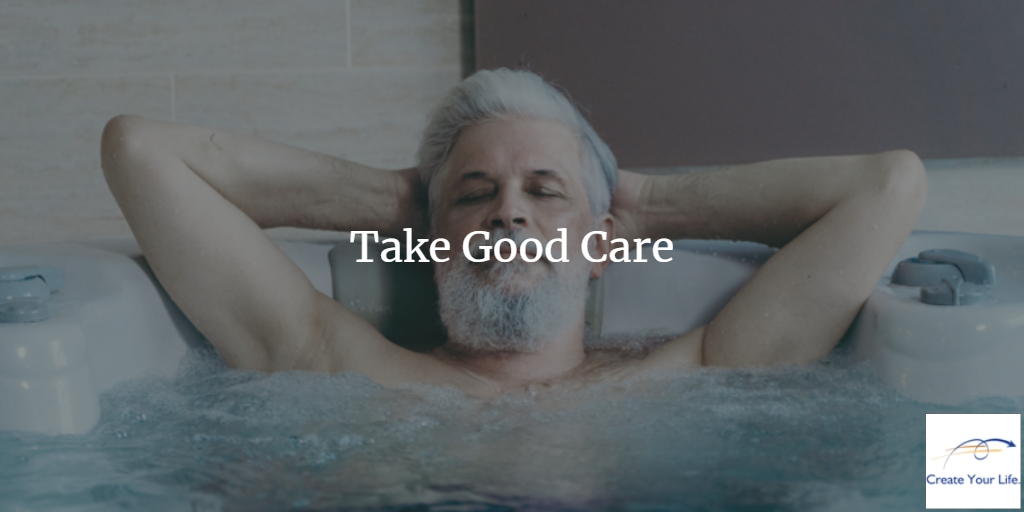You cannot give away that which you do not have. If we are to give our best to the world, we must maintain ourselves in the best possible condition. Each day, our actions move us closer to or further away from health and vitality. If you want to love and care for others, you must first love and care for yourself. This is the basis for Excelerated Selffulness™.
Put Your Oxygen Mask On First
If you’ve ever traveled by plane, you are no doubt familiar with the emergency instructions presented at the beginning of every flight. Including the admonition that, if the cabin pressure drops and oxygen masks are released, to “put your own mask on first before helping others.” The idea being that you can’t help other people unless you’ve taken the step to be sure you have oxygen yourself.
Over time, this illustration has become a metaphor for self-care: take good care of yourself so you can care for others.
But I want to point out that this instruction to put your mask on first is a response to an emergency situation. We can’t wait for an emergency to begin to take good care of ourselves! We need to practice ongoing self-care so we are ready for whatever comes our way, emergencies and all the other things.
“The 2 Easies”
“We all have freedom of choice, but you will never have freedom of consequences. Choose wisely.” ~ Willa Cather
You must remain mindful of your self-care because of the 2 easies: easy to do and easy not to do. We return to this again and again with Jim Rohn’s two easies.
“It all comes down to a philosophical phrase: the things that are easy to do are also easy not to do. That’s the difference between success and failure, between daydreams and ambitions.” [Rohn]
Sometimes it appears that we or others are getting away with unhealthy choices and bad habits. But that is an illusion. Because our choices – good and bad – are compounded over time, it can take a long while before the damage becomes apparent. But, when it does show up, “it’s significant damage. And the remainder of a lifetime may not be enough to deal with the ill effects.” [Leonard]
To take good care of yourself requires attention and action; you can’t choose the consequences but you can choose your actions. And remember. in the beginning, they are easy to do. But they are also easy not to do.

Why Choose Selffulness?
“When you take better care of yourself, you start believing that you are worth more.” ~ Talane Miedaner
When you choose selffulness and begin taking better care of yourself, your self-esteem goes up. You believe you are worth more. When you believe you are worth more, you naturally do more to care for yourself. And the more you care for yourself, the more your self-worth increases. It becomes a virtuous circle, an upward spiral.
And another important point: the more you take good care of yourself, the more you have to give to the world.
What Selffulness Is
Excelerated Selffulness™ means you are taking excellent care of yourself — perfecting the present and setting the stage for an even brighter future. It is caring for yourself in all areas of your life: health, wealth, self-esteem, and relationships.
Selffulness is not indulgent. It is necessary if you are to give your best in Service to the world.
What Selffulness Is Not
“Self-care is not selfish. You cannot serve from an empty vessel.” ~ Eleanor Brownn
Sometimes, we are reluctant to devote time to taking good care of ourselves. We may feel that we are taking time away from loved ones or from work that must be done.
That’s one reason why it’s important to understand the difference between being selfish and being selfful. To be selfish is to put one’s own needs and desires ahead of others. Sometimes, we think that the opposite of selfish is selfless – having no concern for ourselves and always putting the needs of others first.
But the less in selfless has a negative connotation. Instead, consider the word selfful. When we are selfful, we take care of ourselves as well as caring for those around us. We don’t wait for an emergency to “put our oxygen masks on”. We take steps to keep our own resources filled so that we can use those resources to serve others.
What Selffulness Doesn’t Do
“When all of [our needs] are being met, our lives move forward smoothly, like a wheel rolling down the road.” ~ Hyrum W. Smith
Selffulness does not mean having life in perfect balance. Most of us have one area where we spend more time and energy. It may be a career, our family, spiritual pursuits, or even fun. And, these areas are likely to change over time.
You can concentrate in one area, but spend enough time in the other areas to stay in balance, to keep the wheel round and rolling. It’s when you put most of your time and energy into one part of your life and neglect the others, that you begin to feel out of balance. You feel like something is missing. In effect, your wheel is flat.
Once I had a flat tire on my car and my friend helpfully pointed out, “It’s only flat on the bottom.” Your wheel may only be flat “on the bottom”, just one area neglected. It still impedes your progress.
“Balance” doesn’t mean “equal”. To take good care of yourself, you don’t have to spend equal amounts of time in every area. But you do have to spend enough time. Practicing selffulness helps keep you in balance. Not equal in all areas, but rolling along with a properly inflated tire.

What Selffulness Does
” . . . a wise man . . . built his house on rock. It rained hard, the floods came, and the winds blew and beat against that house. But it did not fall because it was built on rock. . . a foolish man . . . built his house on sand. It rained hard, the floods came, and the winds blew and beat against that house. And it fell with a loud crash.” Matthew 7:24 – 27 (ERV)
Do you remember the Bible story of the wise man who built his house on rock and the foolish man who built his house on sand? The sand proved a poor foundation and the foolish man’s house tumbled down at the first big storm.
Nothing is more important than getting a good, solid, level foundation IF you want a strong structure. Everything to come goes on top of the foundation. If it is firm and solid, the rest of the building has a better chance of being solidly built.
And so it is for building a strong, solid life. To create an Excelerated Life™ – a life of flourishing and well-being – you must begin on a solid foundation. A strong personal foundation is the base upon which you can build a satisfying and fulfilling life. And one of the aspects of building a strong foundation is to take good care of yourself – to practice selffulness.
What To Do
So, how can you begin the practice of selffulness? Here is a list of 25 items that are necessary to your self-care. [CoachU] This is by no means an exhaustive list, but it’s a good start. Use this as a guideline to ensure you are taking extremely good care of you.
- I live in a nurturing home environment.
- My relationships add energy to my life.
- There is absolutely no clutter or messes in or around my home or office.
- I am fully aware of every aspect of my physical environment and draw energy from it.
- If I don’t like something, I fix it, now.
- I have a complete physical exam every 1 to 2 years.
- I exercise 3 to seven times a week for at least 30 minutes.
- I am calm and adrenaline free.
- I know what motivates me.
- I am working with a personal coach who has a track record of helping others practice extreme self-care.
- I have a supportive relationship with God (or my personal equivalent).
- I have a friend or family member who is always a source of unconditional support and love for me.
- If I have money concerns or problems, I work them out completely, using an expert or team of experts.
- I drink at least half a gallon of filtered water each day.
- I do not smoke.
- I rarely drink alcohol.
- I do not use caffeine.
- I rarely eat sugar.
- I treat my body like the temple it is.
- I have tossed every single article of clothing that does not make me look great.
- My teeth look great and I smile broadly at every opportunity.
- I say no easily.
- I know what my strengths are and I have installed support systems to do for me what I can’t, won’t, or don’t do for myself.
- I stretch daily.
- I have specially identified time just for me in my schedule.
How To Do It
You now have a list of some specific self-care practices you can try. Here are some examples, from different life areas, of ways you can take good care of yourself by putting these practices into action. Again, use these ideas to start your own creativity flowing. What could you do to improve your selffulness program?
Health: Are you minding the fundamentals? In his book, Eat, Move, Sleep, Tom Rath tells us that if we focus on the basics of taking care of ourselves — proper nutrition, adequate activity, and plenty of sleep — a synergy develops and we begin an upward spiral. Don’t focus only on diet, or exercise, or even sleep — look for ways you can make small, daily, incremental improvements in all 3 areas together.
Tolerations: What are you tolerating, putting up with? These may be petty annoyances or major situations that you have been ignoring. When you ignore things, your propensity to accept them grows. Take good care of yourself and your environment by deciding that you’ll no longer endure those petty annoyances that grate on your nerves. Begin today to deal with yours.
Reserves: It is wise to build a reserve in all the resources of your life – money, time, health, energy, and love. Having a reserve in every resource in every area of your life frees you up to create the life you want. Without reserves, your energy is taken up by thinking about and dealing with the lack of resources. Building reserves is a way to acknowledge the abundance you already have in your life. Having a reserve is having enough — enough that you aren’t wasting mental energy worrying about that part of your life. Enough means different things to different people. What does it mean for you?
Positivity: Studies show that it is possible for positive emotions to increase personal resources, both physical and mental. These studies have shown that increases in positive emotions result in improved immune functioning, reduced inflammation from stress, increased resistance to infections, improved resiliency, and lowered cortisol in the body. Some good ways to boost positivity include investing in your social support and friendships and to connect or reconnect with family.
Spirituality: Attend church or other religious services regularly. Pray or meditate. Read in the wisdom literature or have daily devotional readings. Find ways to connect to the spiritual in your daily activities. Begin a spiritual discipline such as prayer, fasting, meditating, solitude, service, worship, or celebration.
What Not To Do
In The 7 Habits Of Highly Effective People, Dr. Stephen Covey discusses the concept of “P/PC Balance”. P stands for Production – getting the desired results from an asset, such as a car, or a machine, etc. PC indicates Production Capability – the capacity of the asset to produce the desired results. You must take measures to insure production capability or you lose the desired production of the asset. [Covey]
Covey uses the example from Aesop’s fable about the goose and the golden eggs. The goose is the production capability, the golden eggs are the production. If you don’t take good care of the goose, you eventually lose the golden eggs. If you focus only on your own production output, without caring for your production capability, you’ll break down and burn out.
When You Don’t Choose Selffulness
We can run our bodies – sometimes for years – without paying much attention to production capability. We eat junk, food-like substances, rarely exercise, give over to worry and stress. And in reality, you can go for months or years without any warnings of the problems that are building.
If when you ate a cheeseburger you immediately had a heart attack, you probably wouldn’t eat that many cheeseburgers. Or if you got diabetes right after you drank a can of soda, you likely wouldn’t drink many sodas. On the other hand, if you developed a lean, fit body after 30 minutes of exercise, you’d be at the gym this morning.
That often makes selffulness a difficult choice because the long-term effects are not immediately noticeable. One cheeseburger won’t make any difference in your weight or general health. One workout won’t leave any sign of improvement. But over time, these small actions accrue and compound. They are working for you or they are working against you. When you don’t choose selffulness day by day, these small lapses in discipline add up to failure. [Olsen]
When You Choose Selffulness
But when you choose to take good care of your production capability, you can be productive for many years. For most of us, becoming selfful takes time and practice. We may have years of indoctrination (from ourselves and others) to not be selfish, to give rather than receive. But as we have seen, you cannot give what you don’t have.
If you want to give food to the food bank, you need some food. If you want to give money to a charity, you need some money. And if you want to love and care for others, you must first love and care for yourself. This is the basis for Excelerated Selffulness™. You cannot give away that which you do not have.
YOU are your biggest asset. Everything you are, everything you do, everything you have depends on how you use your physical, mental, and emotional faculties. So, how are you treating your biggest asset? If you’ve been neglecting the maintenance of you, now’s the time to change that.
If we are to give our best to the world, we must maintain ourselves in the best possible condition. Each day, our actions move us closer to or further away from health and vitality. I encourage you to replace any thoughts about self-care being selfish with being selfful . . . taking good care of yourself and filling your own vessel so you can better serve others. That is embracing your Excelerated Life™!
What is your most basic self-care practice?
What is one thing you could start doing or stop doing that would have a big impact on your selffulness?
Share your thoughts by leaving a comment below.
Excelerated Selffulness™ — taking excellent care of yourself — is one step in creating your Excelerated Life™, a life of flourishing and well-being, and a life of meaning, purpose, and service.
Read more about the Excelerated Life™.
Resources:
Coach U, Inc. Coach U’s Essential Coaching Tools. Hoboken, NJ: John Wiley & Sons, Inc., 2005.
Covey, Stephen R. The Seven Habits Of Highly Effective People. New York: Simon & Schuster, 1989.
Leonard, Thomas. The 28 Laws Of Attraction. New York: Scribner, 1998.
Olson, Jeff. The Slight Edge. Austin, TX: Greenleaf Book Group Press, 2005-2013.
Rath, Tom. Eat Move Sleep: How Small Choices Lead to Big Changes. Arlington, VA: Missionday, 2013.
Rohn, Jim. Leading an Inspired Life. Niles, IL: Nightingale-Conant Corporation, 1997.


